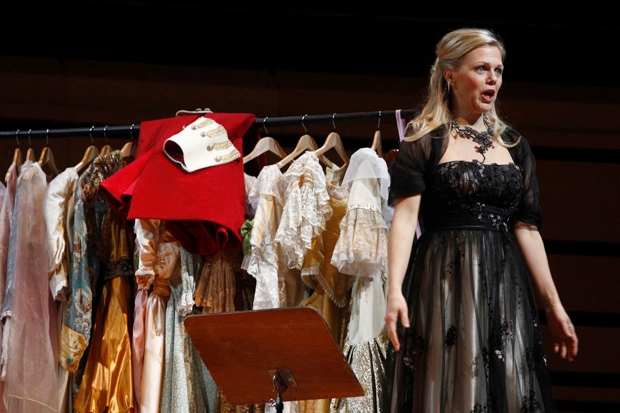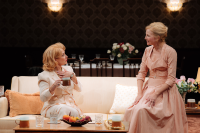Is Stravinsky’s The Rake’s Progress anything more than an exercise in style? ‘I will lace each aria into a tight corset,’ Stravinsky told Nicolas Nabokov, and for most of three acts that’s pretty much what he does, deftly fitting W.H. Auden and Chester Kallman’s libretto to a steadily chugging parade of his smartest, pertest neoclassical tricks. The motor-rhythms, the acid harmonies, the borrowings from Mozart, Rossini and Handel: it’s all brilliantly accomplished and supremely knowing.
In small doses, it’s appetising enough, and even at full length there’s much to enjoy — especially when played with the relish that Sir Andrew Davis and the Scottish Chamber Orchestra brought to this concert performance. The Usher Hall acoustic couldn’t blur the sheer exuberance with which the SCO players brought out the primaries and pastels of Stravinsky’s score: whirring strings, blowsy trumpets and a pair of slithering, snorting bassoons who clearly felt the whole piece had been written as a double concerto just for them.
The real problems with The Rake’s Progress are in the foreground; problems which, paradoxically, come into sharper focus when it’s performed this well. The various grotesques with which Auden and Kallman peopled their Hogarth-based scenario make for delicious cameos, and both Alan Oke, smarming and fussing for Scotland as the auctioneer Sellem, and Susan Bickley — just sufficiently over-ripe as Baba the Turk, complete with purple harem pants — found an ideal mixture of absurdity and pathos. Of the three central figures, Emily Birsan’s poise and sunny voice as Anne Trulove made her an excellent match for Andrew Staples’s cringing Tom Rakewell: the purity of her tone suggested the possibility of redemption — musically, at least — for Staples’s slightly querulous tenor.
With characters who are essentially line drawings, it’s hard to ask for much more — any more than one could expect either of them, really, to stand much of a chance against the opera’s sole fully realised figure. As Nick Shadow, Gidon Saks’s bass-baritone rang out with brazen power and hissed viciously at the bottom of its range; Saks had the kind of stage presence that drew the eye even while he was slouching by the stage door. In the opera’s superbly conceived penultimate scene, as Rakewell gambles with Shadow for his soul against midnight chimes and an eerily jangling harpsichord, Saks seemed to grow, stalking around Staples like a big cat measuring up its prey.
Here, for the first time in the piece, it’s possible to believe that something real is at stake. Saks and Staples’s exchange was genuinely gripping. But after two and a third acts of tightly corseted comedy, it’s simply too late to start feeling that any of this actually matters. With a cast, an orchestra and a conductor as committed as this (plus bravura choral singing from the Royal Conservatoire Voices), the final impression was of a gap between means and ends — and of frustration at seeing this level of artistry, both creative and in performance, expended on an opera that’s really just an ingenious toy.
A new production of Le Nozze di Figaro opened at the Festival Theatre the following night. Stravinsky didn’t hesitate to measure himself against Mozart, so it’s perfectly fair to note that by the end of Susanna and Figaro’s first recitative, Mozart has already created two more believably human characters than Igor and Wystan managed in their entire three acts. That remains the case even when — as here — they’re surrounded by members of the Budapest Festival Orchestra and a ramshackle collection of risers and costume rails, with the conductor/stage director Iván Fischer sitting right in front of them, carving away.
Yes, conductor and director: ‘My identity is changing too,’ announces Fischer in the programme book (he’s already mastered director-speak). ‘The performance starts as a concert and then eventually, is dressed up as an opera. I call it a “staged concert”.’ In fact, that transformation lasted little longer than the overture. Barring some awkwardly contrived business with period costumes, what we saw for the rest of the evening was a more or less straight production of Figaro on an unusually cluttered stage. Musically, it was on a high level. Miah Persson sang with melting tenderness (though occasionally under the note) as Countess Almaviva, Sylvia Schwartz was a delightfully spirited and generous Susanna and if, as Figaro, Hanno Müller-Brachmann’s voice had frayed slightly by Act Three, his charisma hadn’t.
The Budapest Festival Orchestra played with flashing brilliance even while periwigs were being dropped on to their heads, and smiled politely throughout an overlong scene change, during which Fischer mooched about, hand in pocket, assuring the audience that ‘it’s going well’. Great conductors don’t automatically make good or even competent directors. Fischer got by — just — on the quality of his performers and the curious fact that while a first-rate performance does no favours to The Rake’s Progress, even in a misconceived production Figaro remains unsinkable.






Comments